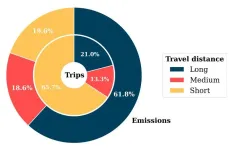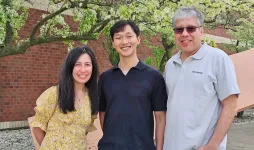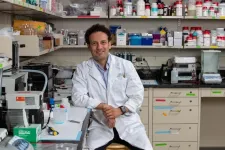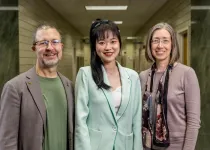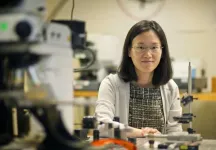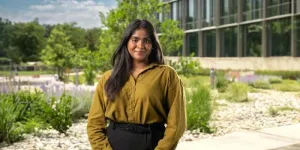(Press-News.org) Carbon emissions associated with air travel to professional conferences make up a sizable fraction of the emissions produced by researchers in academia. Andrea Gokus, a McDonnell Center postdoctoral fellow in the Department of Physics in Arts & Sciences at Washington University in St. Louis, is advocating for a reduction of these emissions.
In a paper published in PNAS Nexus, Gokus and collaborators estimated the CO2-equivalent emissions for conference travel to all 362 open meetings in the field of astronomy in 2019.
The total is an estimated 42,500 tons, or about 1 ton per participant per meeting. But it doesn’t have to be that way.
“Networking and discussing new scientific developments at meetings is important for advancing the field, but adjustments can be made to reduce their hefty carbon cost,” Gokus said.
Via virtual meetings, the CO2-equivalent emissions due to travel can almost completely be eliminated. But such virtual offerings are often not regarded as efficient networking opportunities. Meeting organizers should consider preferentially locating conferences as close as possible to the majority of as many participants as possible, Gokus said, avoiding scenarios in which most are flying intercontinentally.
“My co-authors and I are all members of the grass-roots organization Astronomers for Planet Earth, or A4E,” said Gokus, who first became interested in sustainable astronomy during the annual meeting of the European Astronomical Society in 2020, which took place virtually due to the pandemic. “There are several other papers covering the emissions from particular meetings, including some recurring ones. But our paper is the first systematic study of all open meetings in an entire field.”
In addition to pure virtual meetings, Gokus and her co-authors propose hybrid formats and meetings held at a small number of physical hubs, which can then be virtually linked.
This approach has the potential to reduce long-haul (i.e., intercontinental) travel in particular, which contributes the majority of emissions. If intercontinental travel is unavoidable, the study authors suggest maximizing the time spent at the travel destination: by visiting the institutes of collaborators in the country, for example, and by choosing train or bus connections during such visits.
These choices not only make astronomy meetings greener, but they also can make astronomy more inclusive as a discipline, Gokus said. The researchers’ findings and suggestions could be applied to other academic disciplines as well.
Traveling to meetings is often more challenging for those from less-wealthy institutes; those farther from North American and European hubs; people who have to manage complex visa bureaucracies; researchers with disabilities; and those with caretaking responsibilities, she explained.
In her own space sciences research at WashU, Gokus focuses on the high-energy emission of active galactic nuclei, in particular blazars. She is interested in the processes occurring in their jets and studies their flux and spectral variability using instruments that cover the entire electromagnetic spectrum.
“What is great about making meetings more sustainable is that it can easily go hand in hand with making astronomy more inclusive as well,” Gokus said. “By making use of technology to connect virtually, we can foster a more inclusive collaborative approach, which can help us advance our understanding of the universe further. It is important that we work together as a community to achieve this goal, because there is no Planet B.”
END
Astronomers share climate-friendly meeting solutions
2024-04-30
ELSE PRESS RELEASES FROM THIS DATE:
Missing link in species conservation: Pharmacists, chemists could turn tide on plant, animal extinction
2024-04-30
As the world faces the loss of a staggering number of species of animals and plants to endangerment and extinction, one University of Michigan scientist has an urgent message: Chemists and pharmacists should be key players in species conservation efforts.
"Medicinal chemistry expertise is desperately needed on the frontlines of extinction," said Timothy Cernak, assistant professor of medicinal chemistry at the U-M College of Pharmacy. "Animals are dying at staggering rates, but they don't have to. Modern ...
Illinois researchers develop an AI model to reduce uncertainty in evapotranspiration prediction
2024-04-30
URBANA, Ill. – When scientists look at the Earth’s available water for ecosystem services, they don’t just look at precipitation. They must also account for water moving from the ground to the atmosphere, a process known as evapotranspiration (ET). ET includes evaporation from soil and open water pools such as lakes, rivers, and ponds, as well as transpiration from plant leaves. The difference between precipitation and ET indicates the water balance available for societal needs, including agricultural and industrial production. However, measuring ET is challenging. A new study from the University of Illinois Urbana-Champaign ...
Is it time to retire the best-before date?
2024-04-30
The inventors of a suite of tests that enable food packages to signal if their contents are contaminated are working to bring producers and regulators together to get their inventions into commercial products, with the goal of preventing illness and reducing food waste.
Though the tests would cost just a few cents per package, food producers are reluctant to add costs that consumers will ultimately have to bear, say the McMaster researchers behind an article published today in the journal Nature Reviews Bioengineering.
A system based on smart packaging, the researchers say, would save producers ...
An electrifying discovery may help doctors deliver more effective gene therapies
2024-04-30
MADISON — In an effort to improve delivery of costly medical treatments, a team of researchers in electrical engineering at the University of Wisconsin–Madison has developed a stimulating method that could make the human body more receptive to certain gene therapies.
The researchers exposed liver cells to short electric pulses — and those gentle zaps caused the liver cells to take in more than 40 times the amount of gene therapy material compared to cells that were not exposed to pulsed electric fields. The method could help reduce the dosage needed for these treatments, making them much safer and more affordable. The research appears April 30 in the ...
Lurie Children’s Hospital first-in-pediatrics to use technology that lights up lung cancer during surgery
2024-04-30
Ann & Robert H. Lurie Children’s Hospital of Chicago is pleased to announce the first pediatric use of the novel fluorescent agent CYTALUX during surgery to remove lung metastases. The drug allows surgeons to better visualize cancer in the lung, as well as potentially detect additional cancerous nodules missed by preoperative imaging. This drug is FDA-approved in adult patients, but Lurie Children’s is the first-in-pediatrics to have an Investigational New Drug application with the FDA to study ...
$3.6 million to advance nuclear energy awarded to U-M
2024-04-30
Four U-M projects funded by the Department of Energy's Nuclear Energy University Partnerships program aim to make nuclear energy safer and more equitable.
The projects are designed to improve the monitoring of nuclear reactors during operation; explore the safety of an advanced modular reactor design; develop a framework for ethical, consent-based siting of nuclear facilities; and upgrade a facility for modeling radiation damage to reactor components.
Real-time radiation effects on optics
How well could optical sensors monitor future advanced nuclear reactors? Funded with $1 million, Igor Jovanovic, a professor of nuclear ...
Two UT Arlington faculty honored for outstanding research
2024-04-30
The University of Texas at Arlington is honoring two faculty for their outstanding contributions to research.
Yuze (Alice) Sun, associate professor of electrical engineering, and Venu Varanasi, associate professor in the Bone Muscle Research Center, are the 2024 recipients of the University Award for Outstanding Research Achievement or Creative Accomplishment. This award recognizes faculty members for achieving significant research or creative accomplishments during the past three years.
“Alice and Venu are truly bright stars on the faculty at UT Arlington,” ...
UT Arlington student links worm behavior to brain disease
2024-04-30
As an undergraduate student in The University of Texas at Arlington’s Honors College, Hannah Selvarathinam knew she wanted to conduct research. Near the end of her first year at UTA, the Keller native reached out to the lab of biology Assistant Professor Piya Ghose.
“Hannah has been a very impressive scholar from Day 1,” Ghose said. “She had the foresight to reach out for research opportunities very early on.”
Ghose brought Selvarathinam in to work on one of the lab’s core projects ...
Uncovering the secret of long-lived stem cells
2024-04-30
Nothing lives forever, but compared to other cells in the body, hematopoietic stem cells (HSCs) are remarkably long-lived. HSCs are blood-forming cells – they give rise to rapidly dividing progenitor cells, which in turn generate hundreds of billions of cells to fulfill the daily demand of oxygen-delivering red blood cells, disease-fighting white blood cells and clot-forming platelets.
HSCs typically remain dormant within the bone marrow, yet they possess the ability to activate and replenish blood cells continuously, maintaining a relatively youthful profile throughout the life of an organism. What is the secret of ...
The question for online educational platforms: offer courses following a schedule or release them on demand?
2024-04-30
Researchers from Carnegie Mellon University and University of Pennsylvania published a new Journal of Marketing study that examines online educational platforms and the question of whether they should release content through a scheduled format that resembles a traditional university course or use an on-demand release strategy.
The study, forthcoming in Journal of Marketing, is titled “More Likely to Pay but Less Engaged: The Effects of Switching Online Courses from Scheduled to On-Demand Release on User Behavior” and ...
